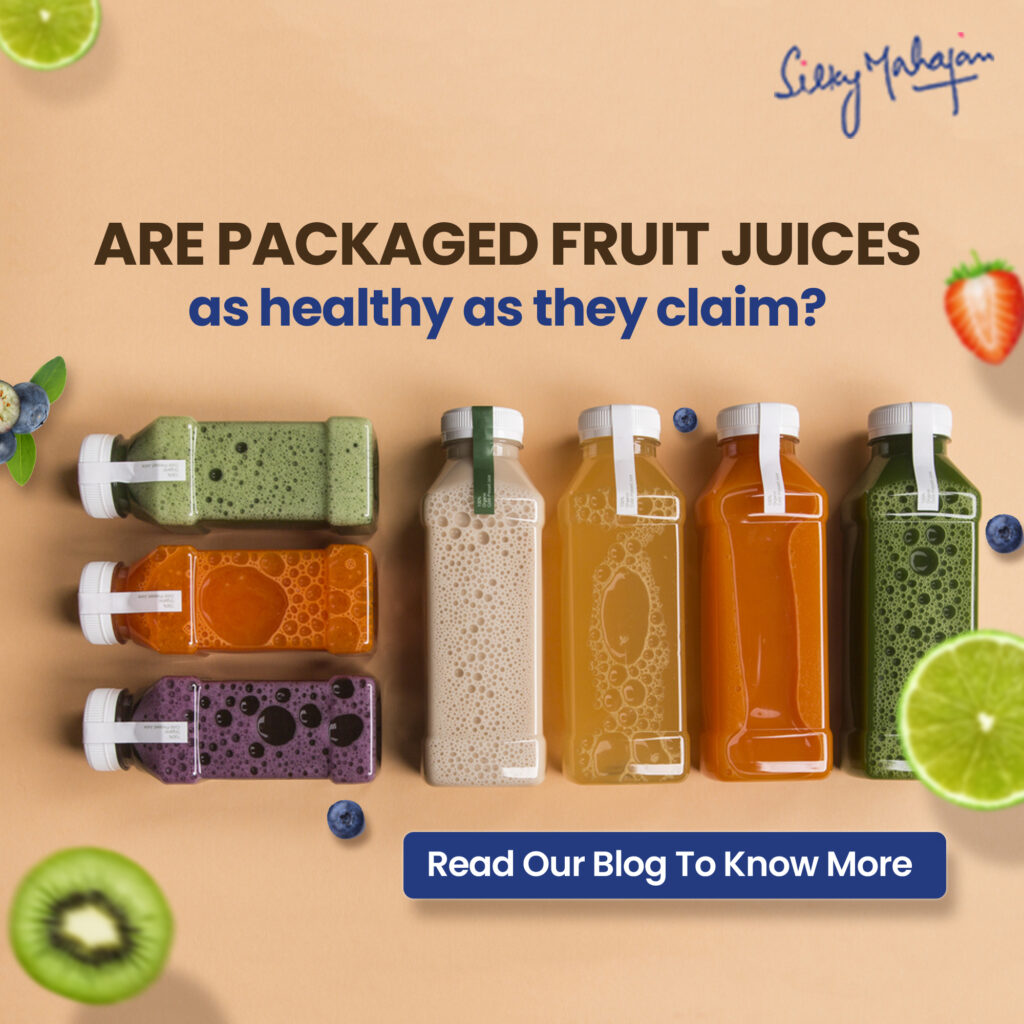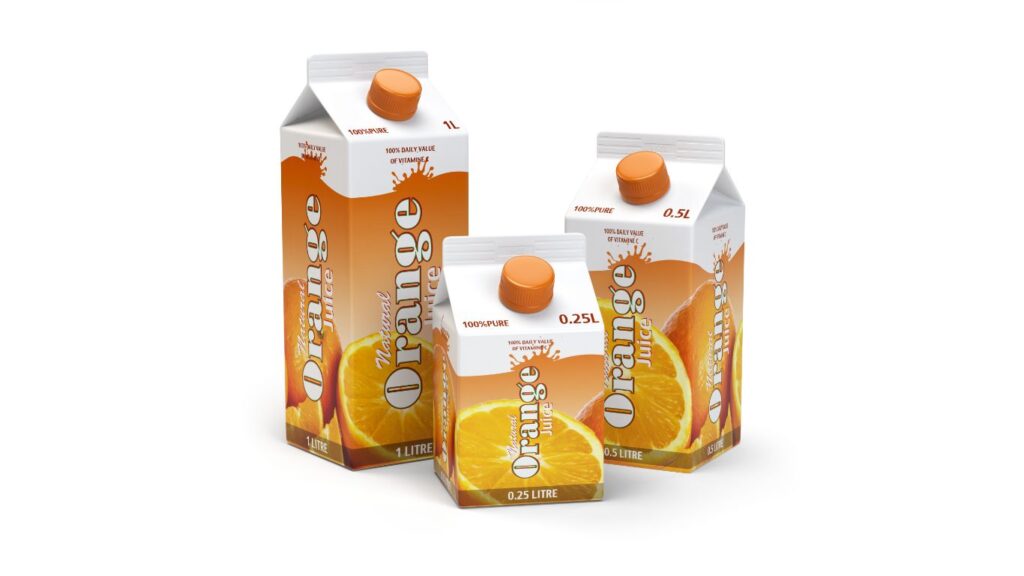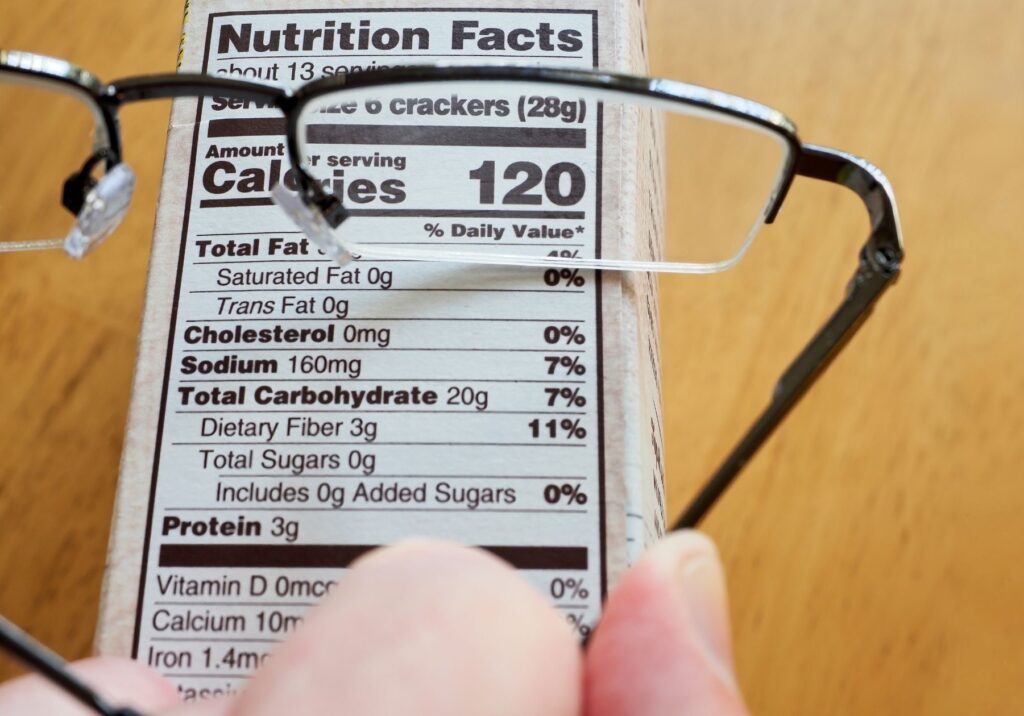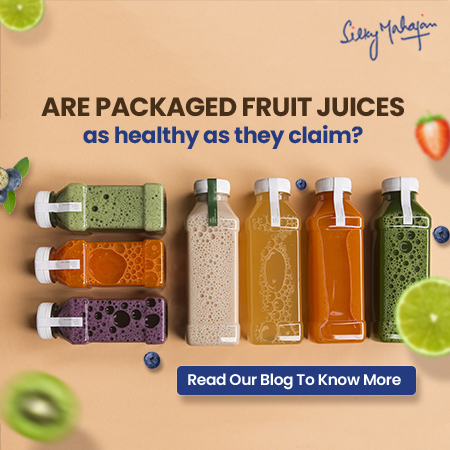
Blog Highlight – Packaged juices are not as healthy as they are marketed to be, you can still consume them in moderation. Try to opt for varieties like not from concentrates and 100% juices. Read on to know more!
Did you know? According to a report from The Economic Times, the consumption of packaged fruit juices in India has gone up by almost 47% in recent years.
And even you must have felt inclined at some point to pick up a bottle of fruit juice in the supermarket, thinking it to be a healthy option. Well, it’s time to think again!
Packaged fruit juices are packed with hidden ingredients like sugar, preservatives, and artificial colours and flavors.
Thus, in this blog, we shall dig deep into the truth behind packaged fruit juices and find out if they are as healthy as they claim to be.
The Allure of Packaged Fruit Juices

Packaged fruit juices appeal to customers because of how they are packed and marketed. Moreover, they offer convenience, satisfying our desire for a quick and easy way to consume fruit.
In addition to this, their sweet and tangy flavors tantalize our taste buds, making them a popular choice among both adults and children. However, it’s the health claims that one can find on their packaging that often seal the deal. Promises of vitamins, antioxidants, and natural goodness lure us into believing that we’re making a healthy choice.
Most fruit juices you see in the supermarket are often labeled with different names of vitamins and antioxidants in bold graphics. This makes many consumers believe that these juices are actually healthy for us.
Well, it’s time to unravel the truth.
What’s in a Package? Understanding Ingredients and Nutritional Labels

Packaged fruit juices often seem like a simple and healthy choice. However, if you take a closer look at their ingredients and their nutritional labels, you can find a more complex reality. Thus, you need to understand what really goes into manufacturing these beverages to understand if they are healthy or not.
Below are some of the common ingredients found in packaged fruit juices.
Fruit Juice Concentrate: Many packaged fruit juices start with fruit juice concentrate, which is essentially fruit juice with the water removed. While this process preserves the flavor and nutrients of the fruit, it also concentrates the sugars.
1. Water
This is a base ingredient found in almost all fruit juices. It is added to achieve the desired consistency and flavor in the juice.
2. Added Sugars
In addition to the natural sugars present in fruit juice, manufacturers also add extra sugars to enhance sweetness. These added sugars contribute to the overall calorie content of the beverage. However, they don’t provide any additional nutritional value.
3. Artificial Flavors and Colors
To enhance taste and appearance, manufacturers may include artificial flavors and colors in packaged fruit juices. These additives are often synthetic and may not offer any health benefits, and in some cases, may actually be harmful for us.
4. Preservatives
Preservatives such as citric acid or sodium benzoate may be added to packaged fruit juices. This is done to prolong shelf life and prevent spoilage. And although they are generally recognized as safe by regulatory agencies, some individuals may have sensitivities to these additives.
5. Vitamins and Minerals
Some packaged fruit juices are fortified with vitamins and minerals to enhance their nutritional profile. However, the amounts added may vary, and these fortified nutrients may not be as readily absorbed as those naturally occurring in whole foods.
The key here is to read the nutritional labels on these juices. Try to look out for added sugars, artificial sweeteners, and high levels of sodium. You need to understand these labels to make informed decisions about your dietary intake.
Nutritional Breakdown: The Good, The Bad, and The Sugary
Now, let’s look at the nutritional content of packaged fruit juices.
1. Sugar content
Many packaged fruit juices contain high levels of sugar, which are both natural and added. And although the sugar naturally found in fruit juices provides sweetness, the concentration of these sugars in packaged fruit juices is much higher than you would find in whole fruits. Moreover, sugar may also be added to the juices to enhance their flavour.
Whole fruits also contain natural sugars, but they are accompanied by fiber, which slows down the absorption of sugar into the bloodstream. This natural packaging of sugars in whole fruits helps prevent rapid spikes in blood sugar levels compared to packaged fruit juices.
2. Vitamin content
Many packaged fruit juices claim they have high levels of vitamins. This is because the companies add extra vitamins to juices to fortify them. However, the processing involved in producing these juices leads to the loss of some vitamins. In addition to this, these are synthetic vitamins that aren’t fully absorbed by our bodies.
Whole fruits are naturally rich in vitamins, including vitamin C, vitamin A, and various B vitamins. These vitamins are present in their natural form, along with other phytonutrients and antioxidants that contribute to overall health and well-being. Moreover, being natural, these nutrients are better absorbed by our bodies.
3. Fiber content
Packaged fruit juices don’t have any fiber in them. The process of making the juice involves eliminating any pulp or fiber to get 100% liquid juice.
However, on the other hand, whole fruits are an excellent source of dietary fiber. They include both soluble and insoluble fiber. Fiber not only aids in digestion and promotes bowel regularity but also helps regulate our blood sugar levels. Fiber also helps us feel full and prevents us from overeating.
The Sugar Debate: Natural vs. Added Sugars
Not all sugars are created equal. While fruits naturally contain sugars, they also provide fiber, vitamins, and minerals, which mitigate their effects on blood sugar levels.
However, the sugar in packaged fruit juices is often concentrated and lacks any fiber. This can lead to weight gain, insulin resistance, and an increased risk of chronic diseases such as type 2 diabetes and heart disease. Thus, it’s important to distinguish between natural sugars found in whole fruits and added sugars that are used in processed juices.
A key takeaway here is that sugar, natural or artificial should be had in moderation. If you are consuming whole fruits and trying to watch your weight, it may be a good idea to avoid eating sugary fruits too much.
Not All Juices Are Created Equal: The Variety Dilemma
Nowadays, you have a variety of fruit juice options to choose from. You get fruit juice concentrates, juice blends, and even 100% fruit juices. Let’s look at what each of them have to offer and whether they are healthy for us or not.
1. Fruit juice concentrate
Fruit juice concentrate is made by evaporating the water content from the fruit juice. This results in a concentrated liquid that can be reconstituted with water before packaging. Juices made from concentrate are often more affordable and have a longer shelf life due to the removal of water. However, the processing involved may result in a loss of flavor and nutrients.
2. Fruit juice from not concentrate
Fruit juices made not from concentrate are manufactured by pressing fresh fruits and packaging the resulting liquid without further processing. These types of fruit juices have higher nutrient contents than their concentrate counterparts, as they are made without much processing.
3. 100% juice
100% juice contains only the juice of the specified fruit, with no added sugars, artificial flavors, or preservatives. These juices offer the purest form of fruit juice and provide the most nutritional benefits. These types of juices are the most natural versions of juices you can get in the market.
4. Juice blends
Juice blends combine the juice of multiple fruits or vegetables. Most of the time sweeteners or other ingredients are added to it. Juice blends tend to have lower nutritional value compared to 100% juice. They may also contain added sugars or artificial flavors which make them an unhealthy option for us.
The Health Implications of Packaged Fruit Juices: Weighing The Pros and Cons

| Pros | Cons |
| Convenience – Packaged fruit juices offer a convenient way to consume fruits on the go, especially for individuals with busy lifestyles. | High Sugar Content – Packaged fruit juices often contain high levels of sugar, both natural and added. This can contribute to weight gain, insulin resistance, and an increased risk of chronic diseases like type 2 diabetes and heart disease. |
| Nutrient Intake – Some packaged fruit juices are fortified with vitamins and minerals. This provides an additional boost to nutrient intake. | Lack of Fiber – Most packaged fruit juices lack the fiber found in whole fruits, which plays a crucial role in digestion, satiety, and blood sugar regulation. This can lead to spikes in blood sugar levels and may contribute to feelings of hunger and overeating. |
| Hydration – Fruit juices can help maintain hydration levels, especially for those who struggle to drink enough water throughout the day. | Calorie Intake – Drinking too much fruit juice can contribute to excessive calorie intake, especially if they are consumed in addition to having a regular diet. This can lead to weight gain and obesity over time. Use our calorie counter to count the number of calories you need. |
| Antioxidants – Certain fruit juices contain antioxidants, which can help combat oxidative stress and reduce the risk of chronic diseases. | Dental Health – The high sugar content in fruit juices can also increase the risk of tooth decay and cavities, especially if consumed frequently throughout the day. |
Parting thoughts
Although packaged juices are not as healthy as they are marketed to be, you can still consume them in moderation. Try to opt for varieties like not from concentrates and 100% juices. However, it’s still advisable to consume them sparingly as they have sugar in them which can hinder your weight loss journey and pose health risks over time.
So, the next time you reach for that carton of fruit juice, remember to read the label and think twice about what you’re putting into your body.
Your health depends on it.
Looking for personalized weight loss and nutrition advice? Get professional help from the best dietitian and nutritionist in Bangalore here!






